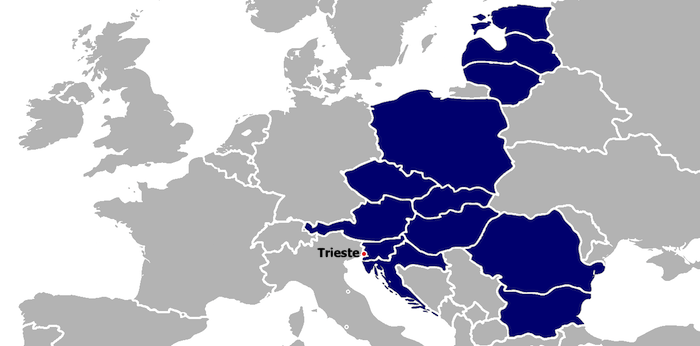The strategic consequences of the new Italian political crisis
Trieste and the area of the Three Seas Initiative
Analysis by Paolo G. Parovel
The Italian national election of 4 March 2018 confirmed that at this point the majority of Italians refuses the increasingly inept and corrupted political establishment that has ruled Italy so far ruining citizens and enterprises.
That majority expressed its protest in two ways: by refusing to vote, and voting the two parties – Five Stars and the League – that declare to oppose the old politica system, proposing concrete social and economic measures.
Abstention was lower than expected, before the vote it was expected to be 50% or more (LINK), yet, it reduced the representativeness of all elected parties, while the sum of the “anti-establishment” parties gave them the majority of seats in the Italian Parliament.
However, the seats are assigned in such way that no party or coalition can govern without alliances and compromises, either permanently or temporarily, and this would upset its electors.
On the other site, the establishment of minority Governments, forced to either advocate the Parliament to obtain majority votes to pass each law or to confidence voto, would constantly risk to shift into politica crisis and new elections.
Also, before the coming into office of a new Italian, it would be the previous one to remain in power, however, although that could exercise institutional roles, it would have no political power, due to being established by the now defeated centre-left coalition.
International observers do therefore consider that Italy cannot have stable governments yet, and also that its instability might complicate the unstoppable structural crisis of the European Union, as well as causing serious problems to NATO in the Mediterranean.
For instance, the renegotiation of European treaties in order to return sovereignty to the Member States is as necessary as it is difficult; also, both newly elected and older Italian politicians have increasingly ambiguous attitudes respect to the Atlantic Alliance as well as respect to the United States of America.
Furthermore, Italy is the only western European Country to officially support and fund the spread of historical-political claims dating back to World War II against the present-day Republics of Slovenia and of Croatia.
Also, it is possible that the extremely serious socio-economic Italian crisis worsens to the point it would be impossible, for any Government, remediating it by ordinary democratic political instruments.
This means that Italy’s political and economic stabilitazion is a problem with primary international strategic relevance, which calls for special attention to both the Italian crisis itself and to the consolidation of the Central-European area, which would be mostly affected by its consequences.
And this means fastening the functional integration of the Countries of the Three Seas Initiative between the Baltic and Eastern Adriatic, where the present-day Free Territory of Trieste and its international Free Port have a decisive strategic role (LINK).
© 7 Marzo 2018
















